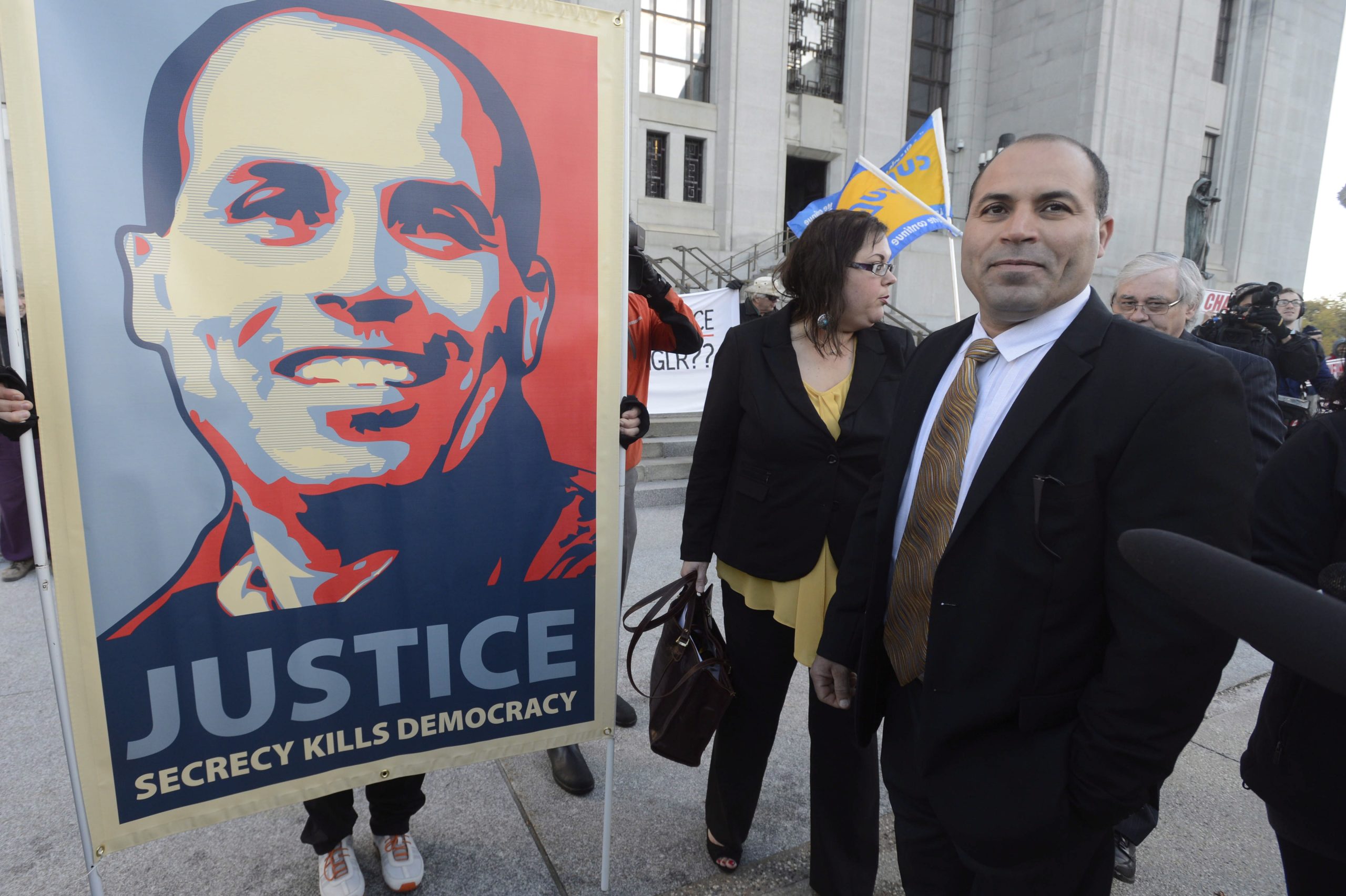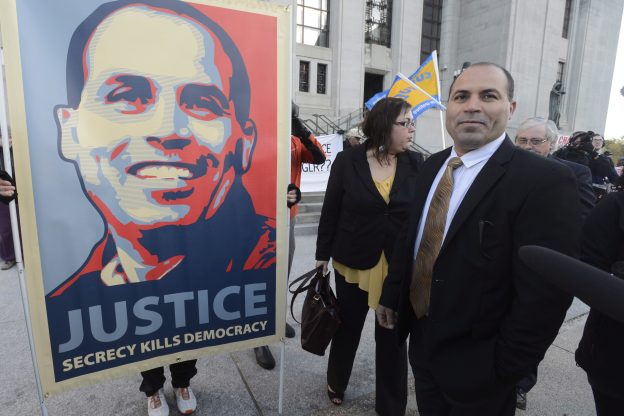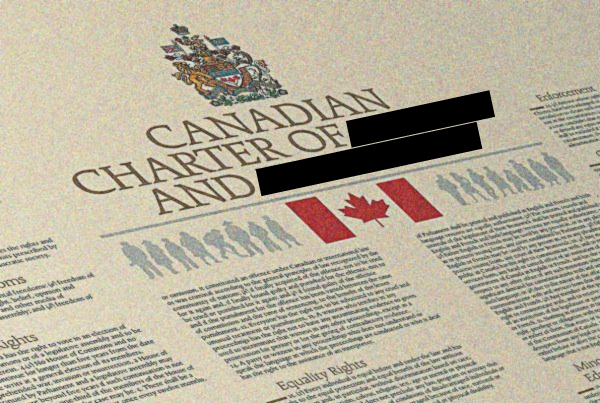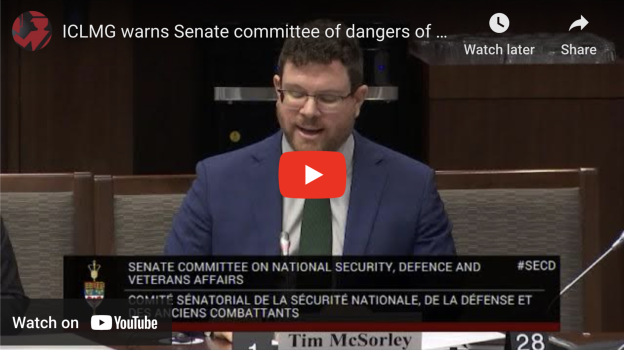
Mohamed Harkat (foreground) and Sophie Lamarche-Harkat (centre). Credit: rabble.ca.
On the occasion of the United Nations International Day in Support of Victims of Torture on June 26th, which marks the moment when the Convention Against Torture came into effect in 1987, we have sent the letter below to the Public Safety minister urging him to stop the deportation to torture of Mohamed Harkat, and to finally put an end to 22 years of injustice.
If you can, please donate to Justice for Moe Harkat to help cover the costs of his legal defense:
And take action to stop Moe Harkat’s deportation to torture:
Thank you!
June 26, 2024
The Honourable Dominic LeBlanc
Minister of Public Safety
269 Laurier Avenue West
Ottawa, Canada
K1A 0P8
Via email
Dear Minister LeBlanc,
I’m writing today on behalf of the International Civil Liberties Monitoring Group, a coalition of 46 civil society organizations that since 2002 has worked to defend civil liberties in Canada in the context of anti-terrorism and national security activities, to raise urgent concerns about the case of Mohamed Harkat.
This year marks 22 years since Mr. Harkat was placed under a security certificate (ironically, on Dec. 10th – International Human Rights Day), and the beginning of the ordeal which has continuously undermined his fundamental rights.
We believe it is urgent that you act on Mr. Harkat’s case. Having been recognized as a refugee in Canada, Mr. Harkat has lived here since 1996 without ever being charged or convicted of a crime. Yet, because of the security certificate based on secretive information of questionable origin, Mr. Harkat continues to face deportation to Algeria where he will be at risk of prolonged solitary confinement, forms of treatment that constitute torture or other ill treatment, and an unfair trial based on the fact that he has been publicly identified and described by Canadian officials as a terrorism suspect and security threat.
Our coalition has long decried the use of security certificates, which undermine the rights of the targeted individual by allowing information not normally considered “evidence” to be used against them, and preventing them or their counsel from accessing the whole case brought against them – essentially eliminating any hope of mounting an adequate and full defense.
We believe that security certificates should ultimately be eradicated from Canada’s legal system, and that instead the government should focus on prosecutions under the Criminal Code, which would serve to protect the rights of the accused as guaranteed by the Canadian Charter of Rights and Freedoms and international covenants, and in accordance with the principles of fundamental justice. Despite this, security certificates were in fact significantly worsened through changes brought about with the adoption of the Anti-terrorism Act, 2015. Disappointingly, your government declined to address these issues in the recently passed National Security Act, 2017, and decided to in fact further restrict what information can be withheld from those named in a security certificate and their counsel in the recently passed Countering Foreign Interference Act.
More immediately, we are writing because, as the Minister of Public Safety, Mr. Harkat’s fate is in your hands. Under section 42.1(1) of the Immigration and Refugee Protection Act, the Minister of Public Safety is granted the power to allow Mr. Harkat to stay in Canada where it is not contrary to the national interest. The courts have consistently relaxed Mr. Harkat’s bail conditions over the years, and the Canadian Security Intelligence Service has deemed it unnecessary to even file a risk assessment during Mr. Harkat’s previous hearings. As his work colleagues and supporters have attested, and as court assessments and psychiatrists have demonstrated, Mr. Harkat is committed to leading a peaceful life and letting him stay would not be contrary to Canada’s interests. Moreover, deporting a man to a risk of imprisonment and torture is clearly against Canada’s national interest, as well as its international obligations.
We have closely followed the case of Mohamed Harkat since it came to the public eye in 2002. Under the very problematic security certificate regime, Mr. Harkat was imprisoned in maximum security for 43 months, spent years under house arrest, and faced some of the strictest bail conditions in Canadian history. The original “evidence” against Mr. Harkat was destroyed and the allegations against him are based on the testimony of an informant who failed a lie detector test and was never cross-examined in court. Mr. Harkat has never been charged with, let alone convicted, of a crime.
Life under a security certificate has also had a profoundly negative impact on Mr. Harkat’s well-being. His arrest and time in solitary confinement, the severe conditions of his release and the threat of deportation to torture have resulted in chronic depression, post-traumatic stress disorder and insomnia. Sophie Lamarche-Harkat, Mr. Harkat’s wife, has also spoken of the stress upon her, their household and their family of living with constant Canada Border Services Agency surveillance and the threat of losing a loved one. Throughout all this, Mr. Harkat has gained a community that cares about him deeply. For them, he is simply “Moe,” a loving and soft-spoken man who is always ready to help those around him. They have been living in constant fear since deportation proceedings began in 2015.
Beyond the current impacts of living under a security certificate on Mr. Harkat’s well-being, he faces a credible threat of imprisonment, abuse and torture if, as your government is seeking, he is deported to Algeria.
Amnesty International has noted that the Algerian Code of Criminal Procedure allows those charged under anti-terrorism laws to be detained for up to 12 days without access to legal counsel or charge, creating a window for abuse, and does not prohibit the use of confessions obtained under torture. Amnesty International has also reported on a 2018 case where a journalist was reportedly beaten and waterboarded, held in solitary confinement for over one month. More recently, human rights advocates have shared reports of abuse and torture in Algerian prisons during an ongoing crackdown on civil liberties using overly broad “anti-terrorism” laws.[1] In March 2024, it was reported that an Algerian national who spent 20 years of imprisonment and torture in Guantanamo Bay prison, without ever being charged, was returned to Algeria, only to be arrested, held incommunicado for 12 days, and forced to provide false confessions under duress.[2]
It is also important to note that courts in other countries, such as the UK in 2016[3] and Ireland in 2017,[4] have recognized these concerns and barred their governments from deporting individuals to Algeria as the individuals concerned faced a substantial risk of torture.
On October 26, 2017, Prime Minister Trudeau clearly stated: “I hope people remember to demand of governments, this one and all future governments, that nobody ever has their fundamental rights violated either through inaction or deliberate action by Canadian governments. Nobody ever deserves to be tortured. And when a Canadian government is either complicit in that or was not active enough in preventing it, there needs to be responsibility taken.”
Consequently, we urge you, Minister LeBlanc, to use your unique position and the discretion afforded to you under the law to exempt Mr. Harkat from deportation, end this 22-year ordeal and allow him to stay with his wife and community in Canada.
Doing so would send a clear message that defending human rights and eliminating mistreatment and torture go hand in hand with protecting the safety of people in Canada. It would also ensure that Canada upholds its commitments as a signatory to the UN Convention Against Torture. We do not want this government, or its successors, to have to once again apologize and pay compensation because your government refused to take the right action today.
We would appreciate a timely response to our letter, and if you would like more information or have any questions, we would be happy to meet with you to discuss it further.
Sincerely,
Tim McSorley
National Coordinator
International Civil Liberties Monitoring Group
[1] See: https://www.amnesty.org/en/latest/campaigns/2023/09/a-society-behind-bars-the-effects-of-algerias-widespread-crackdown-on-human-rights/ and https://menarights.org/en/articles/universal-periodic-review-how-address-current-human-rights-crisis-algeria-civil-society
[2] See: https://www.ohchr.org/en/press-releases/2024/05/former-guantanamo-bay-detainee-faces-re-victimisation-algeria-un-experts-say and https://theintercept.com/2024/05/21/guantanamo-algeria-terrorism-prison-saeed-bakhouch/
[3] Parsons, V. (2016, Apr 18). Bid to Deport Six Terror Suspects Blocked After UK Judges Cite Torture Fears in Algeria. The Bureau of Investigative Journalism: https://www.thebureauinvestigates.com/stories/2016-04-18/bid-to-deport-six-terror-suspects-blocked-after-uk-judges-cite-torture-fears-in-algeria
[4] O’Faolain, A. (2018, Aug 1). High Court quashes refusal by Minister of Justice to revoke deportation of Algerian. The Irish Times: https://www.irishtimes.com/news/crime-and-law/courts/high-court/high-court-quashes-refusal-by-minister-of-justice-to-revoke-deportation-of-algerian-1.3583222
Since you’re here…… we have a small favour to ask. Here at ICLMG, we are working very hard to protect and promote human rights and civil liberties in the context of the so-called “war on terror” in Canada. We do not receive any financial support from any federal, provincial or municipal governments or political parties. You can become our patron on Patreon and get rewards in exchange for your support. You can give as little as $1/month (that’s only $12/year!) and you can unsubscribe at any time. Any donations will go a long way to support our work. |





